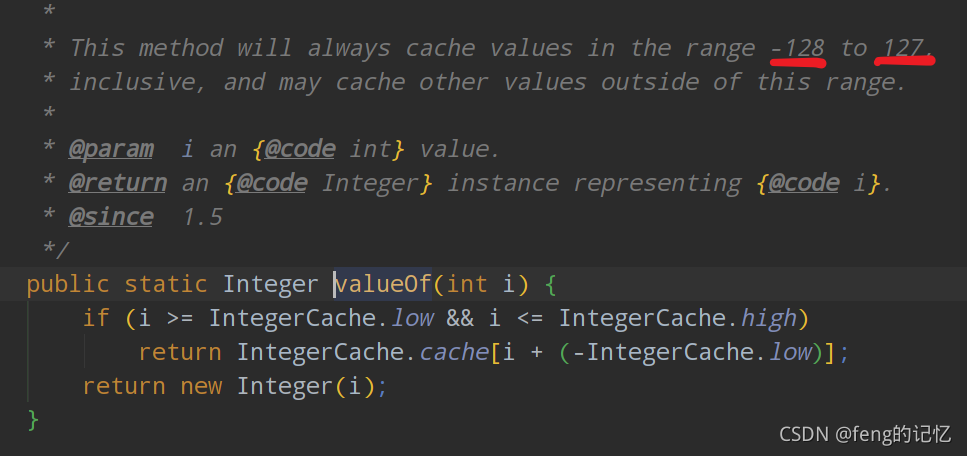Int
Int是Java八种基本数据类型之一,一般大小为4字节32位,取值范围为2-31—231。两个Int类型变量用“==”比较的是值的大小。
|
1
2
3
4
5
6
7
8
9
|
package com.company.algorithm;public class Main { public static void main(String[] args) { int a = 100; int b = 100; System.out.println(a == b);//true }} |
Integer和Integer.valueOf()
将Int值赋给Integer变量,系统会自动将这个Int值封装成一个Integer对象。
比如:Integer a = 100;实际上的操作是:Integer a = Integer.valueOf(100);
以下是valueOf()的源码

注意:这里Integer.valueOf(),当Int值的范围在-128-127之间时,会通过一个IntegerCache缓存来创建Integer对象;当Int值不在该范围时,直接调用new Integer()来创建对象,因此会出现以下的情况
(1)Integer a = 100; Integer b = 100; a==b结果为true,因为这两个Integer变量引用的是缓存中的同一个Integer对象 ;
(2)Integer c = 200; Integer d = 200; a==b结果为false,因为a和b是通过new Integer() 创建的两个不同对象。
|
1
2
3
4
5
6
7
8
9
10
11
12
|
package com.company.algorithm;public class Main { public static void main(String[] args) { Integer a = 100; Integer b = 100; Integer c = 200; Integer d = 200; System.out.println(a == b);//true System.out.println(c == d);//false }} |
new Integer()
new Integer()每次都会创建新的对象,==比较的是两个对象的内存地址
|
1
2
3
4
5
6
7
8
9
|
package com.company.algorithm;public class Main { public static void main(String[] args) { Integer a = new Integer(100); Integer b = new Integer(100); System.out.println(a == b);//false }} |
三者之间的比较
(1)不管是new创建的Integer对象,还是通过直接赋值Int值创建的Integer对象,它们与Int类型变量通过“==”进行比较时都会自动拆箱变成Int类型,所以Integer对象和Int变量比较的是内容大小。
|
1
2
3
4
5
6
7
8
9
10
11
|
package com.company.algorithm;public class Main { public static void main(String[] args) { int a = 100; Integer b = 100;//等价于b=Integer.valueOf(100); Integer c = new Integer(100); System.out.println(a == b);//true System.out.println(a == c);//true }} |
(2)new创建的Integer对象和直接赋Int值创建的Integer对象使用==比较的是它们的内存地址。
|
1
2
3
4
5
6
7
8
9
|
package com.company.algorithm;public class Main { public static void main(String[] args) { Integer b = 100;//等价于b=Integer.valueOf(100); Integer c = new Integer(100); System.out.println(b == c);//false }} |
(3)赋Int值创建的Integer对象比较:
当Int值在-128-127之间时,两个Integer变量引用的是IntegerCache中的同一个对象,内存地址相同,因此==的结果为true;
当Int值不在以上范围时,两个Integer对象都是通过new创建的,内存地址不同,因此==的结果为false
|
1
2
3
4
5
6
7
8
9
10
11
12
13
14
|
package com.company.algorithm;public class Main { public static void main(String[] args) { Integer a = 100; Integer b = 100; Integer c = 200; Integer d = 200; Integer f = new Integer(100); System.out.println(a == b);//true System.out.println(c == d);//false System.out.println(a == f);//false }} |
一个金典面试题
|
1
2
3
4
5
6
7
8
9
10
11
12
13
14
|
package com.company.algorithm;public class Main { public static void main(String[] args) { Integer a = 49; int b = 49; Integer c = Integer.valueOf(49); Integer d = new Integer(49); System.out.println(a == b);//true System.out.println(a == c);//true System.out.println(b == c);//true System.out.println(c == d);//false }} |
到此这篇关于浅谈Java中Int、Integer、Integer.valueOf()、new Integer()之间的区别的文章就介绍到这了,更多相关Java Int Integer Integer.valueOf() newInteger内容请搜索服务器之家以前的文章或继续浏览下面的相关文章希望大家以后多多支持服务器之家!
原文链接:https://blog.csdn.net/qq_40742428/article/details/121183574














